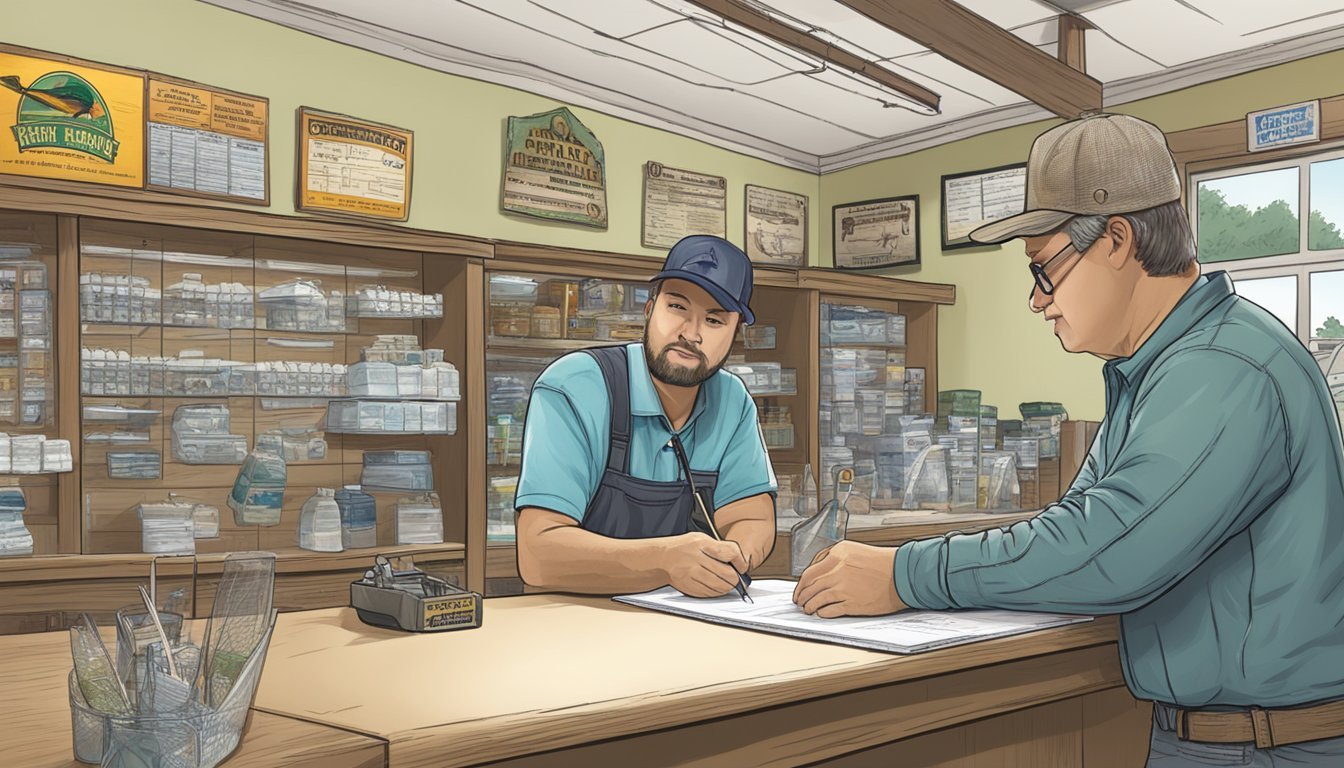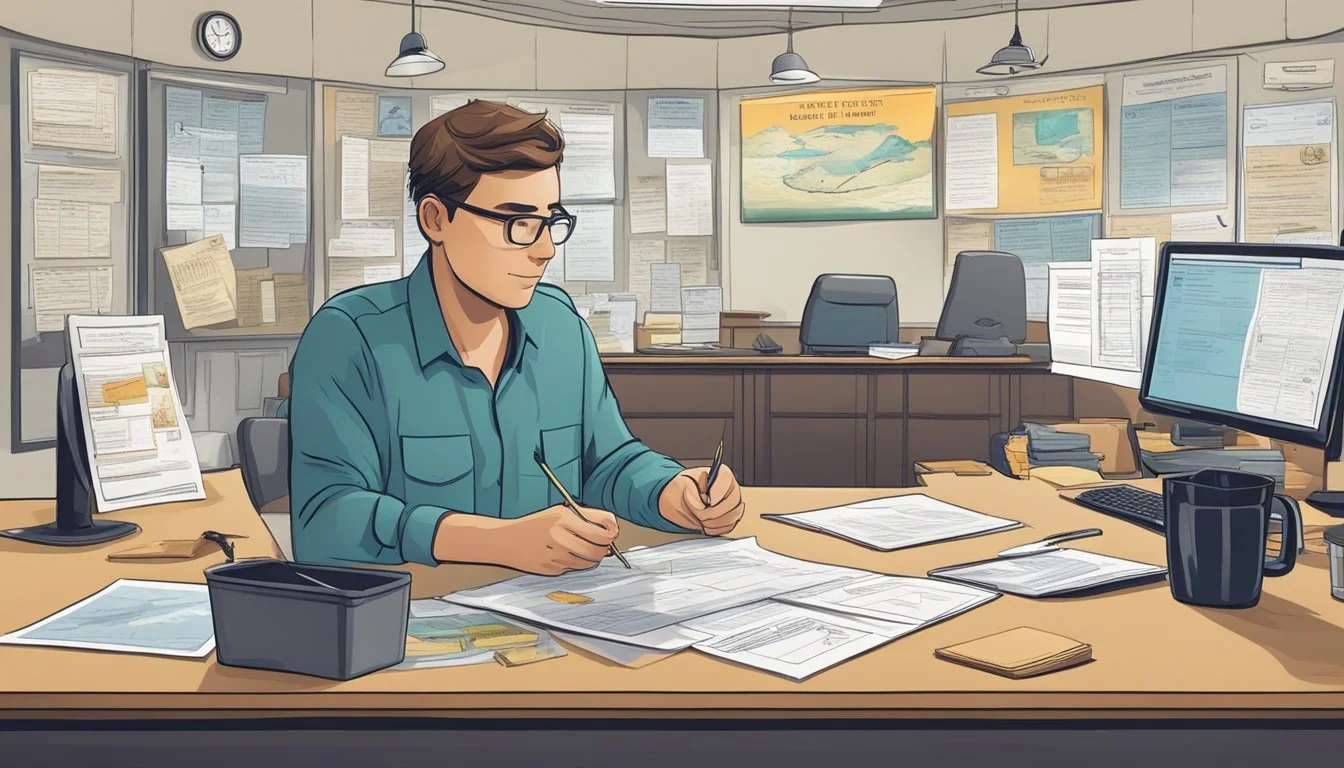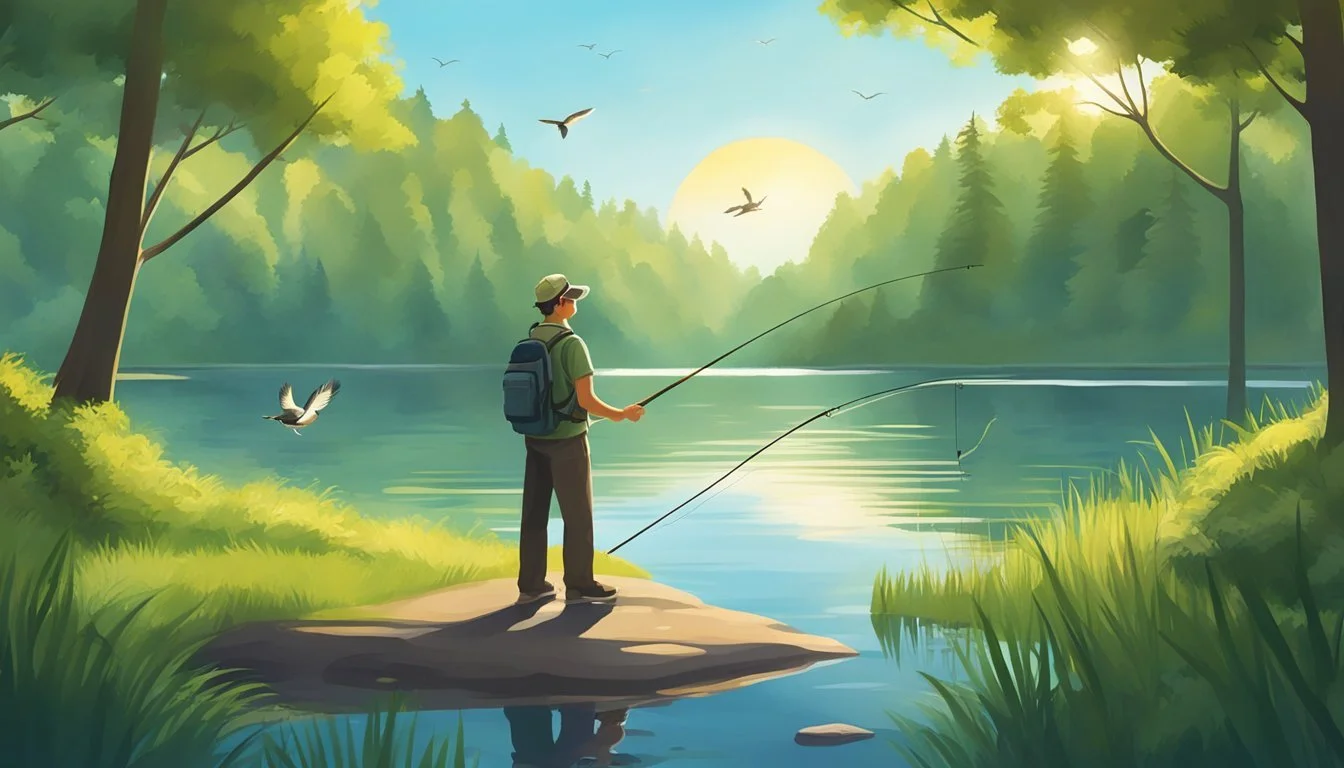How to Get a North Carolina Freshwater Fishing License
Your Ultimate Guide
Angling enthusiasts looking to explore the freshwaters of North Carolina require a valid fishing license. The state offers a myriad of fishing opportunities in its extensive network of rivers, lakes, and streams teeming with a variety of fish species. Whether one is a resident casting a line in a neighborhood pond or a visitor planning a fishing trip to one of the mountain trout waters, North Carolina mandates the procurement of the appropriate fishing license to ensure the conservation of its aquatic wildlife and to support the maintenance of its natural resources.
Obtaining a fishing license in North Carolina can be conveniently done online, where options vary to fit different fishing plans and durations. Residents and non-residents alike can purchase an annual license, while those planning short visits may find the 10-day licenses more suitable. Special privileges are also available, such as the unified inland and coastal license, which grants fishing rights in both areas, making it ideal for anglers who wish to experience all the freshwater and saltwater fishing the state has to offer.
Eligibility for license exemptions and waivers, such as for individuals receiving certain types of government assistance, underscores North Carolina's commitment to making fishing accessible to all. Further information regarding eligibility, fees, and the process for acquiring a license is readily available through the state's official channels, ensuring clarity and convenience for anyone looking to enjoy North Carolina's freshwater fishing experiences.
Understanding Fishing Licenses in North Carolina
In North Carolina, fishing licenses are mandatory for anglers and come in various types to suit different fishing needs. These licenses contribute to conservation efforts and provide access to North Carolina's abundant freshwater and coastal resources.
What Is a Fishing License?
A fishing license is a regulatory measure designed to maintain fishing populations and ensure the sustainability of aquatic resources. In the state of North Carolina, anyone participating in the activity of fishing must have a valid fishing license, except for those under the age of 16. The license grants permission to fish in public waters, upholding fishery management efforts and supporting wildlife conservation programs.
Types of North Carolina Fishing Licenses
North Carolina offers diverse license options catering to local residents and visitors. Key types include:
Inland Fishing License: For freshwater fishing in rivers, lakes, and streams away from the ocean.
Coastal Recreational Fishing: Required for fishing in saltwater areas including the Atlantic Ocean off the North Carolina coast.
Lifetime License: Available to residents, a lifetime license remains valid for the duration of the licensee's life and exempts the holder from future licensing requirements.
The state provides licenses for specific durations ranging from short-term (like the 10-day Inland Fishing License) to annual and lifetime coverage, depending on the angler's requirements.
Benefits of Having a Fishing License
Holding a valid fishing license in North Carolina comes with significant benefits:
Legal Compliance: It ensures that anglers are legally approved to fish, protecting them from fines and penalties.
Resource Management: License fees contribute to preserving the fish population and maintaining a healthy ecosystem.
Access to Fishing Areas: A valid license allows unrestricted access to numerous fishing spots across the state's freshwater and coastal regions.
Purchasing a fishing license is more than a legal formality; it's an investment in North Carolina's natural aquatic habitats for current and future generations.
Eligibility and Requirements
Those seeking to fish in North Carolina's freshwater bodies need to be aware of the state's specific guidelines on eligibility and requirements to legally obtain a fishing license. These regulations ensure that anglers are properly sanctioned to engage in the activity.
General Eligibility
Anyone planning to fish in North Carolina’s public freshwater areas is required to have a valid fishing license. This mandate applies to both hobbyists and sports enthusiasts, with the exception of individuals who fish on a privately-owned pond.
Age-Based Requirements
Youth under the age of 16 are not required to have a license to fish in freshwater. However, anyone 16 years and older must possess a valid fishing license. Seniors can benefit from reduced-cost license options once they reach a certain age.
Residency Status
The state of North Carolina differentiates between resident and non-resident anglers:
Resident: A person must have established permanent residence and lived in North Carolina for a minimum of six months before applying for a resident fishing license.
Non-Resident: Those who have not met the residency requirement are considered non-residents and must purchase a non-resident license to fish in the state's waters.
It is important to carry proof of residency, such as a valid North Carolina driver’s license or state-issued ID, when purchasing a resident fishing license or to produce when checked by authorities.
How to Purchase a Fishing License
North Carolina offers several convenient methods for purchasing a freshwater fishing license: online, by phone, or in person. Each option caters to anglers' preferences for ease and accessibility.
Online Procedures
Purchasing a license online is efficient and can be done 24/7. Individuals will need to visit the North Carolina Wildlife Resources Commission's official website. They should be prepared to provide personal information such as their full name, date of birth, and address. Payment can be made using a credit or debit card.
Navigate to the official NC Wildlife Resources Commission website
Select the appropriate fishing license type
Enter required personal information (ID may be necessary)
Proceed to check out and pay with a credit/debit card
Phone-Based Acquisition
Anglers can also acquire their fishing license over the phone by calling the Wildlife Resources Commission's customer service number. This method will require the same personal information as the online process, and a valid credit or debit card is needed to complete the transaction.
Call the NC Wildlife Resources Commission's customer service
Provide the necessary personal details and ID verification
Select the desired license type
Complete the purchase with a credit/debit card payment
In-Person Purchase Locations
For those preferring to purchase their license in person, numerous locations across the state, including tackle shops, outdoor retailers, and Wildlife Service Agent offices, offer this service. Payment methods may vary by location, so carrying cash, checks, or credit/debit cards is advisable.
Visit a local authorized agent such as a tackle shop, outdoor retailer, or Wildlife Service Agent office
Present ID for verification
Choose the desired fishing license
Pay via cash, check, or credit/debit card
Costs and License Types
Purchasing a fishing license in North Carolina is a requirement for most anglers and varies by the duration and privileges. This section will detail specific costs and options for annual, short-term, and lifetime licenses available to both residents and nonresidents.
Annual Licenses
Annual licenses offer a year's worth of fishing within inland waters. For residents, the Cost of an annual license is typically lower than for nonresidents. Residents can acquire an Inland Fishing Annual License, which includes fishing in Public Mountain Trout Waters and on game lands. Nonresidents can also purchase an Annual License but should expect to pay more.
Short-Term Licenses
For individuals looking for a temporary option, North Carolina provides a 10-day license for both residents and nonresidents. These short-term licenses are ideal for visitors or those planning a brief fishing trip in inland waters of North Carolina.
Lifetime Licenses
Lifetime licenses are designed for those deeply invested in fishing and foresee years of engagement with the sport. A Lifetime License eliminates the need for annual renewal and provides the convenience of a one-time purchase. The cost of lifetime licenses varies and can be higher, but they offer long-term savings over time. It's important to note that lifetime licenses are often available only to residents of North Carolina.
Special Licenses and Privileges
North Carolina caters to a diverse group of anglers by offering specific types of fishing licenses that address the unique needs of different populations, such as military personnel, disabled individuals, and senior citizens. These special licenses provide various benefits tailored to encourage and facilitate fishing activities among these groups.
Military and Veteran Licenses
Active-duty military members and veterans are eligible for special fishing license privileges in North Carolina. Disabled veterans may receive a discounted or free license, subject to certain eligibility criteria, such as being 100% totally disabled. This recognizes their service and sacrifice to the country.
Licenses for the Disabled
Totally disabled individuals and those who are legally blind can apply for unique fishing licenses. These special licenses aim to ensure that disabilities do not hinder the enjoyment and access to North Carolina's fishing resources. The state offers reduced fees or waivers to support their continued participation in the sport.
Senior Citizens' Licenses
Senior citizens, often defined as individuals over the age of 65, have the opportunity to obtain fishing licenses at a reduced cost. This concession is a testament to North Carolina's commitment to making fishing accessible and affordable to its senior residents, encouraging them to stay active in the fishing community.
Regulations and Compliance
In North Carolina, anglers must adhere to established size and possession limits, seasonal fishing regulations, and be aware of the legal consequences of non-compliance. These rules are designed to maintain fish populations and ensure sustainable fishing practices.
Size and Possession Limits
The North Carolina Wildlife Resources Commission enforces specific size and possession limits. These limits dictate the minimum size a fish must be to keep and the maximum number of fish one can legally possess. These regulations may vary by species and sometimes by the body of water being fished. Anglers should refer to the latest regulations provided by the Commission for up-to-date information before fishing.
Size Limits: Follow minimum length and slot limits for certain fish species.
Possession Limits: Adhere to the maximum number of fish allowed to keep in a day or in possession at any time.
Seasonal Fishing Regulations
Fishing regulations in North Carolina can change with the season to protect fish during critical times like spawning. Outdoor enthusiasts are responsible for knowing these time-sensitive regulations.
Closed Seasons: Certain fish species may have closed seasons where fishing is prohibited.
Open Seasons: These are designated times when fishing is allowed for specific species.
Legal Consequences for Non-Compliance
Failure to comply with fishing regulations in North Carolina can result in legal consequences. These penalties help deter illegal activities and promote conservation efforts.
Fines: Monetary penalties for violations can be significant.
License Suspension: Serious or repeated violations may lead to suspension of fishing privileges.
Anglers should keep themselves informed about the latest regulations to ensure compliance and to support the health of North Carolina's freshwater ecosystems.
Additional Resources and Information
When seeking a North Carolina freshwater fishing license, a wealth of information is available through official resources. They provide detailed guidance on obtaining licenses, offer customer support, and explain conservation efforts.
Wildlife Resources Commission
The North Carolina Wildlife Resources Commission is the primary authority managing fishing licenses in the state. It oversees all regulations and provides resources for both residents and visitors. Individuals can find comprehensive information on license types, fees, and purchasing methods through their official website or by contacting a certified wildlife service agent.
FAQs and Customer Support
For specific queries, the commission's Frequently Asked Questions (FAQs) section serves as a quick reference guide. Additionally, customer support is available for more personalized assistance. License applicants can reach out via phone or email to resolve issues or to get answers to more complex questions related to fishing licenses and regulations.
Protecting North Carolina’s Fishing Heritage
The commission is not only a licensing body but also a steward of the state's aquatic environments. It works to ensure sustainable fishing practices and to protect North Carolina’s fishing heritage through regulations and conservation efforts. License fees contribute to this cause, supporting vital research and habitat preservation.
Enhancing the Fishing Experience
To truly enhance one's fishing experience in North Carolina, it is critical to understand the distinct fishing environments, explore the vast array of fishing opportunities and fish species available, and appreciate the conservation efforts that support fish cultivation.
Inland vs. Coastal Fishing
In North Carolina, anglers have the choice between inland and coastal fishing, each offering unique experiences. Inland fishing typically occurs in freshwater bodies such as rivers, lakes, and public mountain trout waters, where game lands are often in proximity. Here, fishing enthusiasts can indulge in the quiet serenity of freshwater fisheries, away from the bustle of coastal areas. Coastal fishing involves saltwater fishing off the coast, where the challenge of a diverse aquatic environment awaits.
Fishing Opportunities and Species
The state is home to an impressive variety of fishing opportunities and species that cater to different angling preferences.
Inland Fishing:
Game Lands: Accessible areas where you might encounter largemouth bass or catfish.
Public Mountain Trout Waters: Designated areas stocking trout, offering abundant fishing opportunities.
Coastal Fishing:
Species like redfish and mahi-mahi thrive in these saltwaters.
Fish Species found in freshwater and coastal regions include:
Freshwater Species Coastal Species Largemouth Bass Mahi-mahi Trout Tuna Catfish Redfish Striped Bass Flounder
Conservation and Fish Cultivation
Conservation efforts in North Carolina are paramount for sustaining fish populations and ensuring ongoing fishing prospects. Fish cultivation practices, especially in freshwater environments, not only help maintain a balanced ecosystem but also contribute to the health of fish species that countless anglers pursue. Both inland and coastal regions benefit from these conservation measures, securing the future of diverse and plentiful fishing experiences in North Carolina.








